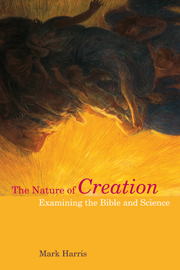Book contents
- Frontmatter
- Contents
- Preface
- Abbreviations
- 1 Introduction
- 2 Creation According to Modern Science
- 3 Creation According to the Bible I: Genesis
- 4 Creation According to the Bible II: The Creation Motif
- 5 The Framework of Biblical Cration
- 6 Creator–creation: How can a Ralationship be Described?
- 7 The Fall
- 8 Suffering and Evil
- 9 Scientific Eschatology and New Creation
- 10 Conclusions
- Bibliography
- Index of Ancient Citations
- Index
Preface
- Frontmatter
- Contents
- Preface
- Abbreviations
- 1 Introduction
- 2 Creation According to Modern Science
- 3 Creation According to the Bible I: Genesis
- 4 Creation According to the Bible II: The Creation Motif
- 5 The Framework of Biblical Cration
- 6 Creator–creation: How can a Ralationship be Described?
- 7 The Fall
- 8 Suffering and Evil
- 9 Scientific Eschatology and New Creation
- 10 Conclusions
- Bibliography
- Index of Ancient Citations
- Index
Summary
Science has not done the Bible many favours lately: it is all too common to hear that it has disproved the Bible. In my opinion this misrepresents both. This book, which explores the relationship between the Bible and science by focusing on the theological theme of “creation”, is my first attempt to suggest how the Bible might retain its normative status in a scientific world.
Like many who work in the science–religion field, I have come to it by a not altogether straightforward path, and I am sure that this colours my presentation of it. But then the subject is not altogether straightforward either. After a background of many years' research experience in experimental physics, I followed a calling to ordained ministry in the Church of England by undergoing theological training. Discovering that it was every bit as enlivening as physics, I followed this with a number of years' teaching biblical studies in universities. If this has left me with a somewhat Jekyll and Hyde personality – I sometimes approach science as if it were a religious epiphany (Chapter 10), and the Bible as though it were experimental data (Chapter 1) – I hope that I am no more eccentric or eclectic than many of my peers in the science–religion field. What is unusual, I know, is my interest in the Bible. But it is my conviction that it has been neglected for too long in this field, and left to the attention of those who have shown little interest in revealing its riches to mainstream science and critical theology.
- Type
- Chapter
- Information
- The Nature of CreationExamining the Bible and Science, pp. vii - viiiPublisher: Acumen PublishingPrint publication year: 2013



